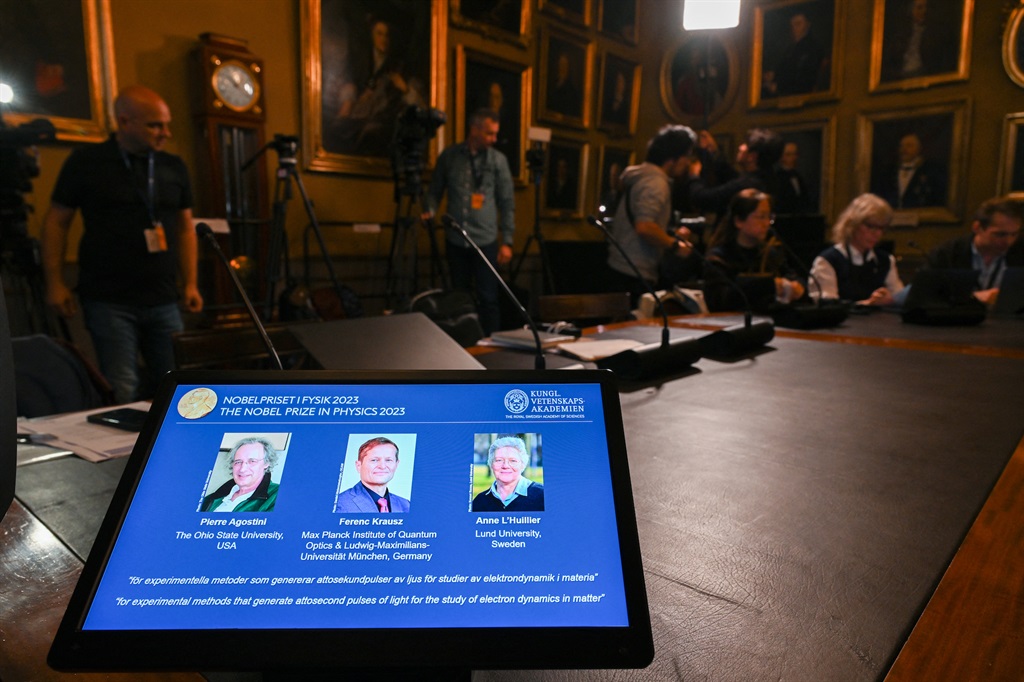
- Three European scientists won the 2023 Nobel physics prize for their attosecond-pulse method.
- The work by Pierre Agostini, Ferenc Krausz, and Anne L'Huillier allows for extremely fast processes to be studied.
- Possible applications include electronics and medical diagnostics.
France's Pierre Agostini, Hungarian-Austrian Ferenc Krausz and French-Swedish Anne L'Huillier were awarded the Nobel Physics Prize on Tuesday for research into tools for exploring electrons inside atoms and molecules.
The trio was honoured "for experimental methods that generate attosecond pulses of light for the study of electron dynamics in matter", the jury said, adding that the research had potential applications in both electronics and medical diagnostics.
"An attosecond is so short that there are as many in one second as there have been seconds since the birth of the universe" over 13 billion years ago, it added.
The researchers "have demonstrated a way to create extremely short pulses of light that can be used to measure the rapid processes in which electrons move or change energy", the jury said.
The laureates' research has made it possible to examine processes that are so rapid they were previously impossible to follow, it said.
"We can now open the door to the world of electrons. Attosecond physics gives us the opportunity to understand mechanisms that are governed by electrons," Eva Olsson, chair of the Nobel Committee for Physics, said in a statement.
In 1987, L'Huillier "discovered that many different overtones of light arose when she transmitted infrared laser light through a noble gas," the Nobel Committee noted, adding that she has continued to explore this phenomenon, "laying the ground for subsequent breakthroughs".
READ | Nobel prize goes to mRNA Covid vaccine researchers
In the early 2000s, Agostini and Krausz worked on experiments that made it possible to isolate light pulses that lasted only a few hundred attoseconds.
Agostini is a professor at Ohio State University in the US, while Krausz is a director at the Max Planck Institute in Germany.
L'Huillier, only the fifth woman to be awarded the Physics Prize since 1901, is a professor at Lund University in Sweden.
L'Huillier told reporters she was in the middle of teaching a class when she received the call from the Royal Swedish Academy of Sciences, making it "difficult" to finish the class.
"I am very touched ... There are not so many women that get this prize so it's very, very special," she said.
L'Huillier and Krausz were believed to be among the contenders, having been awarded the prestigious Wolf Prize last year, together with Canadian physicist Paul Corkum.
Before L'Huillier, Marie Curie (1903), Maria Goeppert Mayer (1963), Donna Strickland (2018) and Andrea Ghez (2020) are the only women to have won the award.
"In my work, I see two things, one of which is very fundamental. Which is to really understand, I mean, look at electrons and look at their properties," L'Huillier said.
"But the second one is much more practical and it's coming," she added, since the technology could become a useful tool in the semiconductor industry.
The physics award is the second Nobel of the season after the Medicine Prize on Monday, awarded to messenger RNA researchers Katalin Kariko and Drew Weissman for their groundbreaking technology that paved the way for mRNA Covid-19 vaccines.
The Physics Prize will be followed by the Chemistry Prize on Wednesday, with the highly watched Literature and Peace Prizes to be announced on Thursday and Friday.
The Economics Prize -- created in 1968 and the only Nobel not included in the 1895 will of Swedish inventor and philanthropist Alfred Nobel, which founded the awards -- closes out the 2023 Nobel season on Monday.




 Publications
Publications
 Partners
Partners























